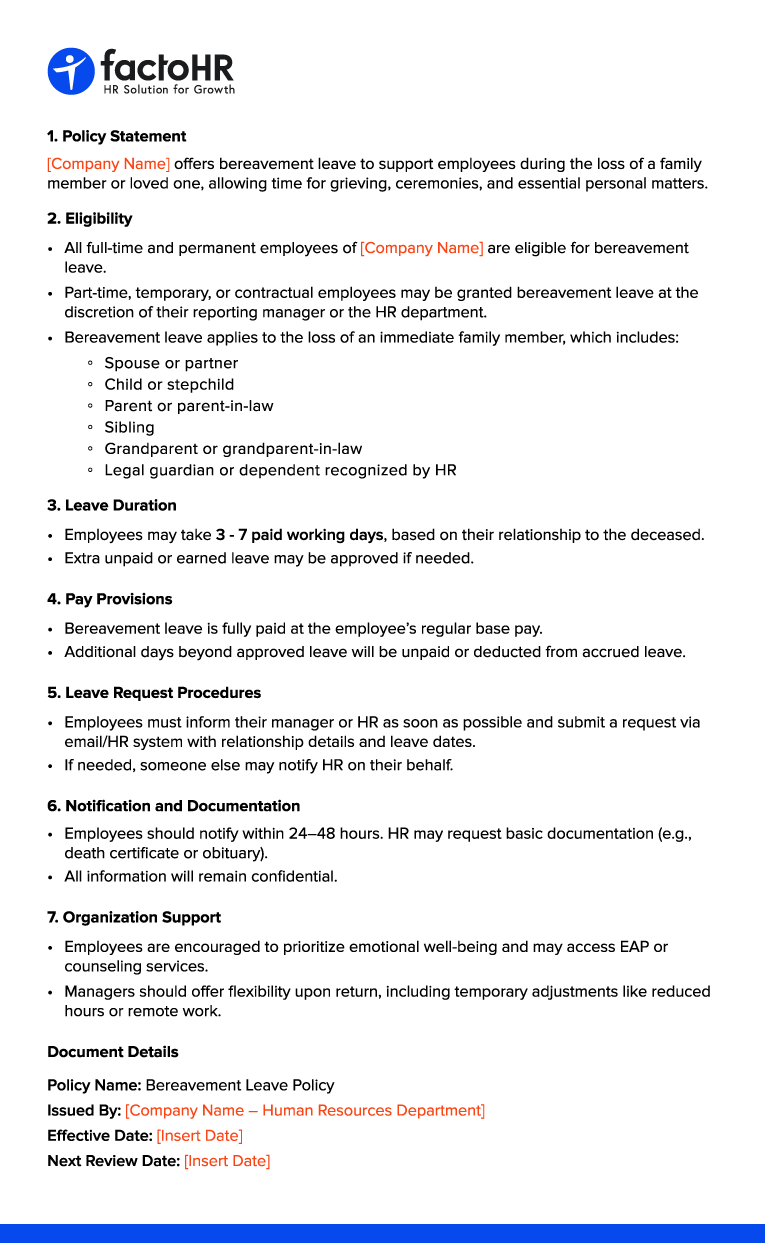What is Bereavement Leave: Meaning, Policy, and HR’s Role

Table of Contents
Grief is a personal experience, and navigating it while managing work commitments makes it even more challenging. Following the death of a close relative, a person needs time to cope with the loss, support family members, and take care of the last rites.
Although bereavement leave is essential, it is not defined by law in India. Many employers recognize the difficulty of navigating loss and include bereavement leave in their policies to allow employees the space to cope without the immediate demands of work.
Each organization sets its own rules, so it is necessary to be aware of the workplace policy.
This guide explains the definition of bereavement leave in India, its working, and the eligibility criteria. It also provides straightforward guidance on how an employee can request leave to attend a family member’s funeral.
Key Takeaways
- Bereavement leave allows employees to take time off after the death of a family member or someone close.
- India has no fixed law governing this type of leave, as the rules vary depending on each company’s policy.
- Some companies provide paid condolence leave, while others offer unpaid time off.
- It supports emotional well-being, family responsibilities, and funeral arrangements, helping staff return to work prepared.
- Bereavement Leave (BL) may also be referred to as grievance leave or compassionate leave in some workplaces.
- Employees must inform their employer, agree on the number of days, and submit any required documents to avoid confusion and ensure support during a difficult time.

What is Bereavement Leave?
Bereavement leave, often called compassionate leave or grievance leave, is time off given to an employee after the death of a family member or someone emotionally close. It helps the person grieve, attend funerals or last rites, and support their family during the loss. This leave is essential for employee well-being because it provides emotional relief and practical support when life becomes overwhelming.
Some organizations include it in their policies, but it is completely the employer’s decision. When offered, it is usually paid, but unused grievance leave cannot be carried forward or encashed.
Importance of Bereavement Leave
Although bereavement leave is meant to support employees during the loss of a close relation, it also plays an essential role in organizational stability.
| Aspect | For Employees | For Employers |
|---|---|---|
| Emotional Well-being | Time to grieve, process emotions, and regain emotional stability. | A more emotionally stable workforce that can return with focus. |
| Practical Arrangements | Provides time to attend rituals, funerals, legal work, and other urgent responsibilities. | Ensures employees manage their personal obligations without disrupting work. |
| Family Support | Provide support to those who need care and comfort. | Reinforces a supportive workplace culture that values families. |
| Reduced Burnout | Helps with stress management while working. | Reduces long-term absenteeism and performance issues. |
| Work Readiness | Return to work prepared to perform duties without emotional overload. | Smoother return to work and better productivity after leave. |
| Organizational Clarity | Clear steps to request leave during a difficult time. | Avoids confusion and ensures consistent handling of such cases. |
| Policy Fairness & Consistency | Employees feel respected and treated fairly. | Protects the organization from bias concerns and complaints. |
Eligibility for Bereavement Leave
Most organizations in India provide official leave to employees to manage the consequences of a family loss. Since there is no universal law governing this leave in India, every employer sets its own rules. Employees should review the compassionate leave policy in the HR manual or consult with the HR team.
Immediate Family
BL is usually granted after the death of a parent, spouse, child, or sibling. These relationships are incredibly close and directly impact an employee’s life, so leave for the death of a family member is commonly approved.
Extended Family
Some employers may allow condolence leave for grandparents, in-laws, cousins, or other relatives, depending on company rules and cultural practices.
Other Relationships
Some employers recognise that emotional bonds are not limited to blood relations, so leave for a relative’s death may be granted for the death of a guardian, a close friend, or someone who played an essential role in the employee’s life. This is usually treated as compassionate leave and may require special approval.
Dependents
If the deceased person depended on the employee for care, such as an adopted child or a dependent elder, grievance leave may be granted to manage responsibilities and emotional impact.
Employment Status
Full-time employees are typically entitled to grievance leave, while part-time, temporary, or contract workers may be eligible under company leave policy and may have more limited or no access to this leave.
Minimum Service Requirement
Some companies require employees to complete a specific period of service before they can apply for this leave, helping ensure the benefit is accessed by employees who have been with the company longer.
Proof of Death
HR teams may request a public notice or a formal death certificate as proof to process the leave request.
Timing of Leave
Grievance leave is usually expected to be taken immediately after the death or within a short period, depending on the funeral and related responsibilities.
Extension of the Bereaved Leave Period
Employees must formally request an extension via letter or email. Failure to provide notice will result in the company making alternative plans. Medical extensions require supporting documents, such as a hospital note or a report from a psychiatrist.
The employee can also use up their annual or sick leave as a backup if they have run out of leave. Letting the employee know that extending the leave could have consequences is essential.

How to Apply for Bereavement Leave
Employees should follow a simple process when requesting grievance leave. This allows the workplace to support them and manage tasks smoothly.
Notify Your Employer
Inform the reporting manager or HR as soon as possible about the unforeseen circumstances. Employees can write a short bereavement leave email, call, or message the authorized person so that the team can plan work arrangements during the leave.
Discuss and Finalise Leave Duration
Speak with HR or the manager to confirm the number of days of grievance leave required, based on policy and personal circumstances.
Submit Required Documents
When required by the company policy, employees may need to provide a death certificate, a funeral notice, or a brief written statement to support the leave request.
Delegate Your Tasks
Share important work details with colleagues or hand over urgent assignments to make sure responsibilities are covered during the absence.
What Should be Included in a Bereavement Leave Policy?
A clear bereavement leave policy helps employees understand their rights regarding family loss and ensures fair treatment across the organization.
Policy Statement
A short statement explaining the purpose of this leave, emphasising support for employees during a difficult time.
Eligibility
This section details who can take this compassionate leave based on relationship, employment status, employee type, and other criteria set in the company’s policy.
Leave Duration
The duration specifies the number of days allowed for different relationships, such as leave for the death of a family member or a relative.
Pay Provisions
It indicates whether the leave is paid or unpaid, as leave policies vary by company.
Leave Request Procedures
This section explains the procedure to apply for condolence leave. It includes details about whom to inform, the recommended mode of communication, and the details that need to be shared with HR or the reporting manager.
Notification and Documentation
It clarifies whether proof, such as a death certificate or written request, is required and within what timeframe.
Organization Support
This describes how the company supports employees during and after leave. Some organizations offer counselling services, flexibility when returning to work, and access to internal well-being resources to help them manage grief.

The Role of HR in Bereavement Leave
HR professionals play a vital role in supporting employees during personal loss. Bereavement leave allows time to mourn and heal, and it’s essential for HR to understand its significance while handling related policies with empathy. The role of HR includes:
- Communicate Policy: Clearly inform employees about bereavement leave eligibility and duration.
- Handle Requests: Process leave applications with empathy and as per company rules.
- Provide Emotional Support: Offer guidance and access to counseling when needed.
- Maintain Confidentiality: Respect employee privacy and keep reasons for leave undisclosed.
- Ensure Coordination: Work with managers to manage tasks during the employee’s absence.
- Update Policies: Regularly review and update bereavement leave policies to stay relevant.
The Standard Bereavement Leave in India
In India, bereavement leave policies vary across organizations as there is no national law governing them. Most private sector companies offer a few days to a couple of weeks of paid leave to help employees cope with the loss of a loved one, while extended leave may be granted without pay. Therefore, it’s important to research and understand common practices before formulating a bereavement leave policy that aligns with both employee needs and organizational standards.
Conclusion
A clear bereavement leave policy helps employees heal from the sudden or expected loss of a close relation. This leave gives them time to recuperate after a family loss and return to work with greater stability. It demonstrates the employer’s compassion, respect, and support in dealing with the emotional and practical responsibilities that follow such situations. HR teams play an essential role by guiding employees through the procedure for requesting condolence leave and providing any necessary documents. When employees already understand the policy, the process becomes easier during an already difficult moment. Overall, the goal is to offer care, respect, and understanding when it matters most.

FAQs
How Many Days is Bereavement Leave in India?
There is currently no fixed law for compassionate leave in India. Most companies offer 3 to 7 days, depending on their policy and the nature of the relationship with the deceased.
What is the Law around Bereavement Leave?
India does not have a legal requirement for grievance leave. Each employer creates their own leave policy.
What if I Need More Bereavement Leave?
Employees can request additional compassionate leave using paid, unpaid, or compassionate leave, in accordance with the company’s rules.
What is Bereavement Leave Used for?
Some organizations refer to it as leave for someone’s death, especially when the person is emotionally close. It is taken to mourn the loss, support family, attend last rites or funerals, and handle related responsibilities.
How to Manage Time off when Bereavement Leave Isn’t Provided?
Employees may use casual leave, earned leave, unpaid leave, or speak with HR for compassionate support.
What Proof is Required for Bereavement Leave?
Companies may request simple documents, such as a death certificate, a funeral notice, or a letter from a hospital or local authority.
Are Bereavement Leave and Compassionate Leave the Same?
Yes, many organizations use both terms to refer to the same type of leave taken after the death of a close relative.
Is Bereavement Leave Paid?
It depends on the organization. Some provide paid grievance leave, while others offer unpaid time off.
Is It Compulsory to Provide Bereavement Leave?
No. It is not mandatory by Indian law, but many employers offer it to support employee well-being during difficult times.
How do I Write a Bereavement Leave Application?
A bereavement leave application should be simple, respectful, and direct. Mention the reason for leave (loss of a loved one), relationship to the deceased, number of days required, and expected return date. You can write it as:
Subject: Application for Bereavement Leave
Dear [Manager’s Name],
I am saddened to inform you of the passing of my [relation, e.g., father]. I request bereavement leave from [start date] to [end date] to attend the rituals and be with my family. Kindly grant me the leave and oblige.
Sincerely,
[Your Name]
Grow your business with factoHR today
Focus on the significant decision-making tasks, transfer all your common repetitive HR tasks to factoHR and see the things falling into their place.

© 2026 Copyright factoHR


